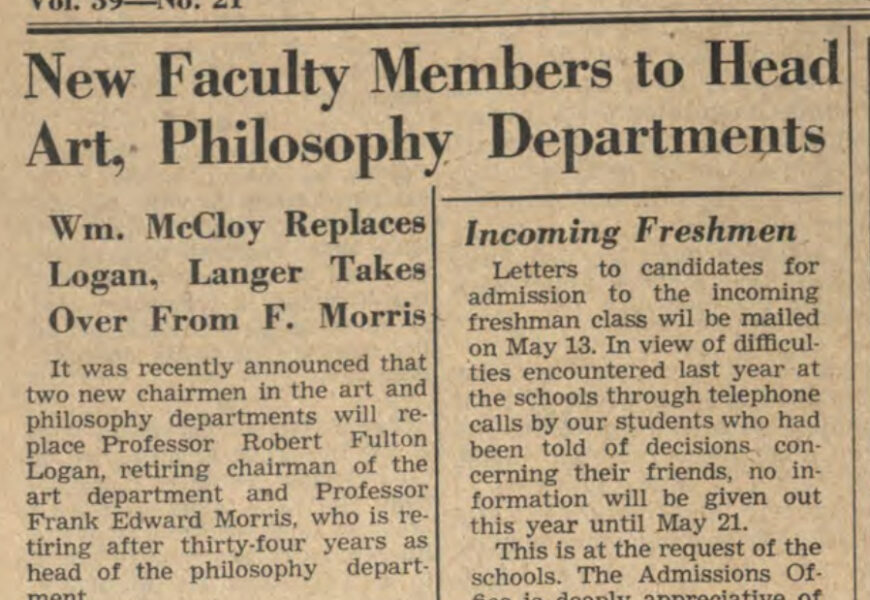Photo courtesy of Connecticut College.
You look at your friend, and they look back at you. The only thing you do is tilt your head and raise your eyebrows, and you both just had a whole conversation. This might seem like a novel experience, but, according to Susanne Langer, conversation and language has been happening through rituals, symbols, and practiced movements for ever. As a philosopher studying aesthetics, linguistics, and symbolic logic, and later a professor and department head at Connecticut College, Langer thought of language as more than simple communication, but also the way that humans create our own reality. She understood that humans have an inescapable need to put meaning to and create symbols for everything, subsequently starting the task of truly understanding.
Langer not only explored the deep human need to create meaning, but also human attachment to art, music, and communication. She argued against the logical positivists, who generally believed that science was the only way to learn true fact, with graceful strength by bringing attention to the importance of the arts. What is astounding about Langer’s main argument against positivism is the way she combats it through the discussion of metaphors. While some of the prominent positivists believe that there are only two types of significant premises, both which require verification from sense-experience or a direct definition, Langer does not look at the world with such rigid values. Metaphor allows us to view and understand language much more deeply than the positivists view. When an object or statement becomes a presentational symbol for something else, it creates a connection between the two statements and stretches the barriers of definition.
These revolutionary ideas culminate in Langer’s work, Philosophy in a New Key. First published in 1941 by Harvard University, it only took about 30 years for the work to sell almost 600,000 copies. While her work was circulating, Langer was teaching at various different colleges, but accepted her first tenured teaching position and chair of department title at Connecticut College in 1954 under Rosemary Park’s college presidency. In the May 5th, 1954 edition of The College Voice, Langer was described as a “distinguished author, teacher, lecturer in philosophy and aesthetics…” This article showed how apparent the pride was at Langer’s start at Connecticut College. Retired Professor Melvin Woody, who joined the Connecticut College staff only a year after Langer left and became chair of the department, wrote a eulogy for her after her death in 1985. His thoughts matched that of the pride written by students about Langer in The Voice. Woody’s eulogy was published in The Day in New London under the title “The Doors that Were Opened by Susanne Langer.” He wrote “When I was a student, everyone had at least one dog-eared copy of Mrs. Langer’s….‘Philosophy in a New Key’, which was a non-fiction best seller and it seemed to be assigned reading for half the courses in the College! …. it was not only assigned to philosophy classes, but turned up on reading lists for courses in anthropology, literature, psychology, religion, art history, and even introductory science.” The versatility in all of Langer’s writing and knowledge is inspiring.
Despite being a quiet and secluded academic, Langer made a large impact not only on the Conn community, but the academic community as a whole. Yet, it’s only in 2021, fifty-nine years after Langer retired from her position at Conn, that a class is being taught on her work. Led by Professors Larry Vogel and Derek Turner, this major texts course, Suzanne K. Langer’s Philosophy, on Philosophy in a New Key is an eye-opening and riveting seminar on a true paradigm in academia. Let’s hope Conn continues honoring her legacy!











Amen! I remember when a few years ago Lewis Gordon, with whom I studied as an undergraduate at Temple University, gave Langer a big shout out at the beginning of a visiting lecture in the Charles Chu reading room in Shain Library, and folks were like who? And Larry Vogel was like oh yes, we need to revisit her! Amen!
How nice to see Suzanne Langer’s work recognized. I read all 3 volumes of “Mind: An Essay on Human Feeling” and used many of her ideas in my own writings. I believe she remains a largely unrecognized genius in the post-Wittgensteinian sense. I think she went so much farther than Wittgenstein did in his explorations of the realms of language in his later works. Starting life as a mathematical logician of repute, to evolve into a cultural/anthropological/linguistic philosopher was an incredible advance yet she remains, sadly, in the backwaters of modern philosophy.